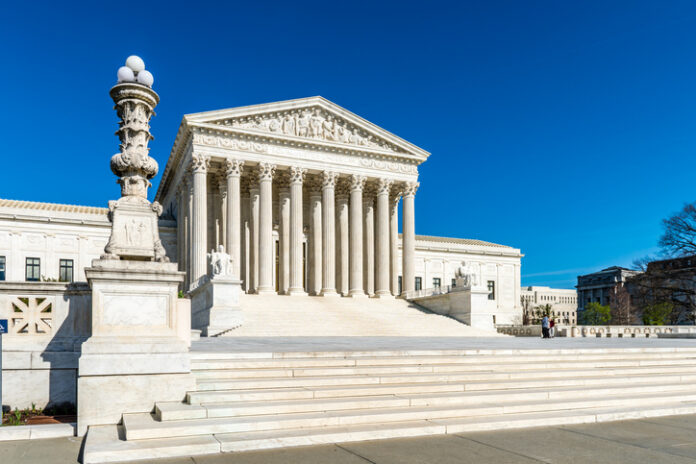The city of Baltimore’s effort to force 23 energy companies compensate it for the costs of climate change through litigation hit a roadblock in May when the U.S. Supreme Court voted 7-1 to overturn a 4th Circuit Court decision to remand the city’s lawsuit to state court, which is generally considered friendlier to state claims, where the case was initially filed.
The majority ruling indicated federal courts are likely the appropriate forum for such lawsuits, possibly serving as springboard to remove similar climate change lawsuits removed from state courts.
The 4th Circuit’s decision to remand to state court, as well as the Supreme Court’s rejection of that decision, focused almost exclusively on a technical analysis of the federal removal statute.
In the ruling, Justice Neil Gorsuch specified the Court had remanded to the 4th Circuit consideration of the merits of the energy companies’ arguments for federal court jurisdiction.
Jurisdictional Issues
Baltimore had sued the 23 companies, including BP, Chevron, ExxonMobil, Royal Dutch Shell, and Texaco, that extract, produce, distribute, or sell fossil fuels.
In the lawsuit, the mayor and city council claim these companies’ activities contribute to emissions of carbon dioxide and other greenhouse gases. The city’s lawsuit asserts greenhouse gases are causing climate change, resulting in rising sea levels and flooding in the port city.
Two of the respondents – Chevron Corporation and Chevron U.S.A. Inc., filed motions to have the case removed to the U.S. District Court for the District of Maryland.
The companies cited eight reasons federal courts were the appropriate forum for the lawsuit. Four relied on specific federal laws, notably the federal removal statute, the bankruptcy removal statute, admiralty jurisdiction, and the jurisdictional grant in the Outer Continental Shelf Lands Act.
Chevron further argued the claims brought by Baltimore are governed by federal common law, rather than state law; raised disputed and substantial issues of federal law; were completely preempted by the Clean Air Act as well as the foreign affairs doctrine; and were based on conduct or injuries that occurred on federal enclaves.
Baltimore moved to remand the case back to state court. In granting Baltimore’s have the case held in state court, the U.S. district court rejected each of the eight theories Chevron asserted in support of removal to federal court.
The energy companies appealed, and also sought to stay the remand to state court, but both the federal district court and 4th Circuit denied this motion.
Dueling Rulings
Justice Samuel Alito recused himself from the case, citing his ownership of energy company stock.
Justice Sonia Sotomayor offered the lone dissent, with the remaining seven justices upholding the supremacy of the federal removal statute.
Although the Court did not address the merits of Baltimore’s case, the majority decision stated “Federal Rules of Civil Procedure allow courts to sanction frivolous arguments made in any context.”
The U.S. Supreme Court did not determine whether the Baltimore’s climate lawsuit actually belongs in federal or state court, but such a ruling may soon be forthcoming, because other federal appeals courts have issued conflicting rulings on this matter. Typically, the Supreme Court acts to resolve conflicting rulings from lower federal courts.
In City of Oakland v. BP PLC, the U.S. 9th Circuit Court of Appeals held climate change nuisance suits do not arise under federal law. In contrast, the 2nd Circuit Court of Appeals, in another case held climate change lawsuits address a “uniquely international problem of national concern” and as a result are governed by federal common law and the 1970 Clean Air Act.
Lawsuit Meritless
Baltimore’s lawsuit is frivolous, based on the claim that oil companies alone are responsible for presumed present and future damages of climate change, says Paul Driessen, senior policy analyst with Committee For A Constructive Tomorrow, which co-publishes Environment & Climate News.
“Baltimore is basically claiming it can ignore all natural causes of climate change and sea level rise, ignore land subsidence factors, ignore fossil fuel use by China, India, and other countries, ignore oil and gas production by Saudi, Russian, and other state-owned oil companies, and just blame 23 U.S. companies for problems it claims, with little or no evidence, is happening now or might happen in the future,” Driessen said. “Baltimore takes no blame for flooding, yet if there is a problem, it has contributed to it.
“Baltimore has laid down vast amounts of concrete and asphalt, built thousands of homes and other buildings, filled in and narrowed waterways,” said Driessen. “Storm waters still have to go somewhere, and they contribute to flooding, and land subsidence also plays a role, because what looks like seas rising is often coastal areas sinking – because of cities, highways, and other human construction and groundwater extraction. Distracting voters and other citizens with nonsense like this is a time dishonored tradition, but it has to end.”
‘Claims … Are Silly’
Baltimore’s case is a prelude for the ultimate judicial and legislative battles over climate policy, says Steve Milloy, publisher of Junkscience.com and member of the board of directors of The Heartland Institute, which co-publishes Environment & Climate News.
“I wouldn’t read too much into the Court’s current ruling,” said Milloy. “This Court decides cases on the most narrow and common grounds possible.
“Absent a specific statute or regulation, all these climate cases will ultimately be rejected as a political question,” Milloy said. “Baltimore’s claims against U.S. oil companies are silly, because there are no damages traceable back to anything any of the defendants have done.”
Duggan Flanakin (dflanakin@gmail.com) writes from Austin, Texas.



























[…] Read the rest of this story here: heartlanddailynews.com […]